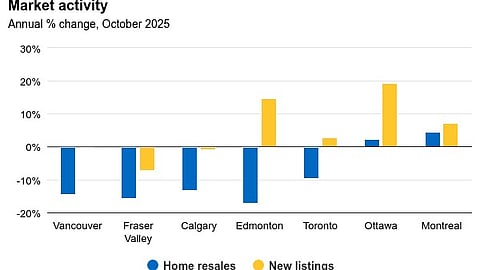

The ‘fall home buying season’ (September, October and November) is winding down, one where buyers took a more measured approach in some Canadian markets, even with lower interest rates, while there was growing confidence in overall economic conditions in other markets, says Robert Hogue, assistant chief economist at RBC Economics.
“Local markets appear generally softer than last fall,” says Hogue. “Yet, early results from real estate boards reveal monthly increases in home resales in several key centres.”
Hogue notes Vancouver, Fraser Valley, Calgary, Saskatoon, and Montreal experienced notable upticks in home resales in October from September, while Edmonton, Regina, Winnipeg, and Toronto recorded modest declines.
“Increased inventory provided buyers with more options and greater negotiating power in Ontario, British Columbia, and parts of Alberta,” says Hogue. “Softening labour markets and persistently poor affordability continued restraining purchases.
“In other regions, low supply and rising home values create different barriers for transactions as buyers contend with limited choice, and higher prices.”
An upsurge in the October job market, the second month in a row of growth, could give markets a lift. Statistics Canada reported on Friday 67,000 new jobs were added in the month, bringing the unemployment rate down to 6.9%.
Prior to the StatsCan announcement, Hogue said a firmer recovery “should gradually emerge as economic momentum builds, and labour market conditions improve, setting the stage for more robust activity ahead,” although the employment increase isn’t likely to affect markets until the new year.
As the fall season winds down, Hogue highlights how Canada’s four largest housing markets performed in October
Calgary: Buyers have more options
“The Calgary market has been largely flat since summer. We estimate home resales increased nearly 5% last month from September, seasonally adjusted, but followed a decline in the previous month,” says Hogue.
The Calgary trend doesn’t mean activity was weak, with October resales more than 40% above pandemic levels.
“Declining prices aren’t necessarily a sign of softness either," says Hogue. “They’re mainly a result of strong housing construction. A ramp-up in homebuilding has significantly boosted supply in Calgary, which now looks more balanced with demand. The inventory of homes for sale has climbed to a seven-year high, creating more competition for sellers.”
“A record number of homes under construction will likely continue boosting supply and keep buyers in the driver’s seat for price negotiations.”
Vancouver area: Fall yet to kick-start market
“The overall picture remains cloudy for Vancouver’s market. A pick-up in resales in October, an estimated 7% gain from September seasonally adjusted, only reversed a similar drop the previous month,” says Hogue.
Affordability is still a major issue in Vancouver, keeping many buyers on the sidelines until the uncertain economic conditions improve.
“The inventory of homes for sale is abundant, providing more options and time for buyers to decide. It also bolsters their hands at negotiating prices,” says Hogue. “Home values have been declining mildly since the start of this year.”
“We expect high inventory, and the ongoing affordability struggle, will drive prices down further in the coming months.”
Toronto area: Stagnant pace
“The Toronto area has been stuck in the last three months with home resales close to 25% below pre-pandemic norms,” says Hogue. “A small 2.3% monthly decline in October entirely offset September’s gain.”
Prices have declined about 5% from this time last year, and are comparable to last spring.
“The lack of buyer zeal likely reflects a combination of factors including tariff-related economic uncertainty, grimmer job prospects, lower immigration and little urgency to strike deals when inventory is high, and prices decline,” says Hogue. “An abundance of homes for sale relative to demand is weighing on values. We expect this to continue in the coming months with condo prices facing the strongest downward pressure.”
“We think recent interest rate cuts will draw buyers from the sidelines, but any recovery is likely to be spotty with poor affordability still a massive obstacle.”
Montreal area: Breaking from the summer lull?
“Montreal buyers were more active last month despite fewer sellers putting properties on the market,” says Hogue. “We estimate home resales rose more than 5% seasonally adjusted in October from September, marking a break from the summer’s constrained activity if sustained.”
Low inventory on the resale and new home markets compared to demand keeps competition between buyers high, fuelling moderate price increases.
“Single-detached homes are gaining the most in value with the median price rising 7.3% in the past year. However, condo values are also up, but by a weaker 3.6%,’ says Hogue. “We expect continuing gradual recovery, as lower interest rates and rebuilding confidence, drive demand.
